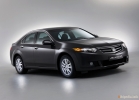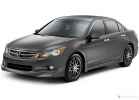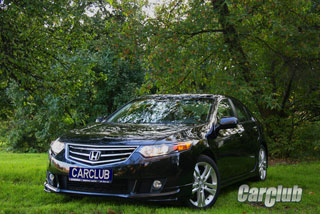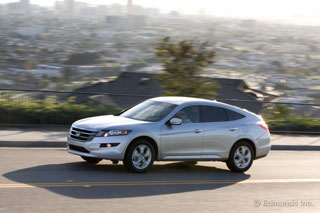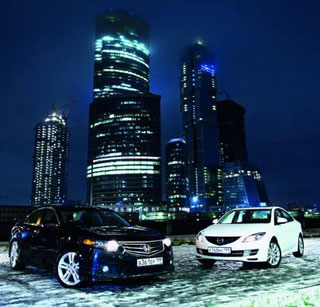Honda Accord test drive since 2008 sedan
Test drive Honda Accord Diesel, 2006
 The time has come to the Japanese to reconsider their attitude to diesel
The time has come to the Japanese to reconsider their attitude to diesel In Tokyo and its environs, oddly enough, cars with diesel engines are prohibited due to a black exhaust. Today we can observe how the restrictions regarding diesel are increasingly tougher in Japan.
Compared to the exhaust of the gasoline engine, the exhaust of the diesel engine contains a very small amount of carbon dioxide, which is so fatal to the ozone layer of the planet. It is for this reason that Europe has long been highly hopes for diesel. In Japan, everything is otherwise considered a much greater problem here noise and vibration, the source of which are cars. And in this aspect, the Japanese public is increasingly tending to hybrids.
Despite everything, Honda already successfully sells its Accord in Europe with a 2200 cubic centimeter turbo engine. The engine uses the third -generation Common Rail in the engine from Bosch, and thanks to high injection pressure and very productive injectors, the perfect combustion efficiency, high torque and impressive power are achieved. In this case, the harmful effects of exhaust gases are significantly reduced. Another feature of this car is low indicators of noise and vibration level.
 Two modifications of the Sports and EX models differ only in configuration, but their capabilities are the same. In both versions, the car is equipped with a six -speed manual gearbox for Europe, where there is a high share of cars with a mechanical transmission. In 2009, Honda plans to bring diesel cars to the US and Japan markets.
Two modifications of the Sports and EX models differ only in configuration, but their capabilities are the same. In both versions, the car is equipped with a six -speed manual gearbox for Europe, where there is a high share of cars with a mechanical transmission. In 2009, Honda plans to bring diesel cars to the US and Japan markets. For the first time, the Accord Diesel was sitting behind the wheel, I started the engine and heard, although a quiet, but distinguishable sound of a diesel engine. But it must be taken into account that at that moment I was in an almost silent underground parking. In the city, I would not notice anything at all. Leaving the main street, I tried to start sharply, and the engine stalled at the car. However, the problem here is not only in my modest driver's abilities. The fact is that because of the turbine, the motor is inclined to failure at low speeds.
You can get used to this, but each time at a sharp start, the likelihood appears that the car will rise. Even at low speeds, the torque is achieved considerable. In fact, if you look at the curve of the torque of the diesel engine, you can see that before the peak of 2000 revolutions, the curve grows very sharply, after which it decreases smoothly. For a gasoline engine, the opposite is characteristic: the maximum is achieved gradually, and then the curve abruptly breaks down. Thus, in terms of speed of acceleration, a car equipped with a diesel engine does not in any way lose its gasoline.
The red tachometer zone at 4,500 speeds at the first speed is 40 km/h, for the second 80 km/h. Compared to a gasoline car, not to say what is impressive, but in practice this does not represent a particular problem. As for the turboyam, difficulties here can arise only at the acceleration stage.
With the increase in vibration revolutions and noise, they become almost invisible so that you can’t say that you are going on a diesel car.
Technical characteristics of Honda Accord Diesel Sport:
Transmission: 6-speed manual transmission
Body dimensions (d w in (mm)): 4665 1760 1445
Wheel base (mm): 2670
Engine: I-CTDI
Engine volume: 2.204 liters
Maximum power: 140 hp (103 kW) at 4000 rpm.
Maximum torque: 340n*m (34.7 kg*m) at 2000 vol./Min.
Compression degree: 16.7
Fuel tank volume: 65 liters
Tire size (front, rear): 225/45R17


Source: Webcg.net
Honda Accord Crash Test Video since 2008
Honda Accord test drives since 2008
Honda Accord Crash Test since 2008
Krassh Test: Detailed Information35%
Driver and passengers
19%
Pedestrians
39%
Children-passengers

